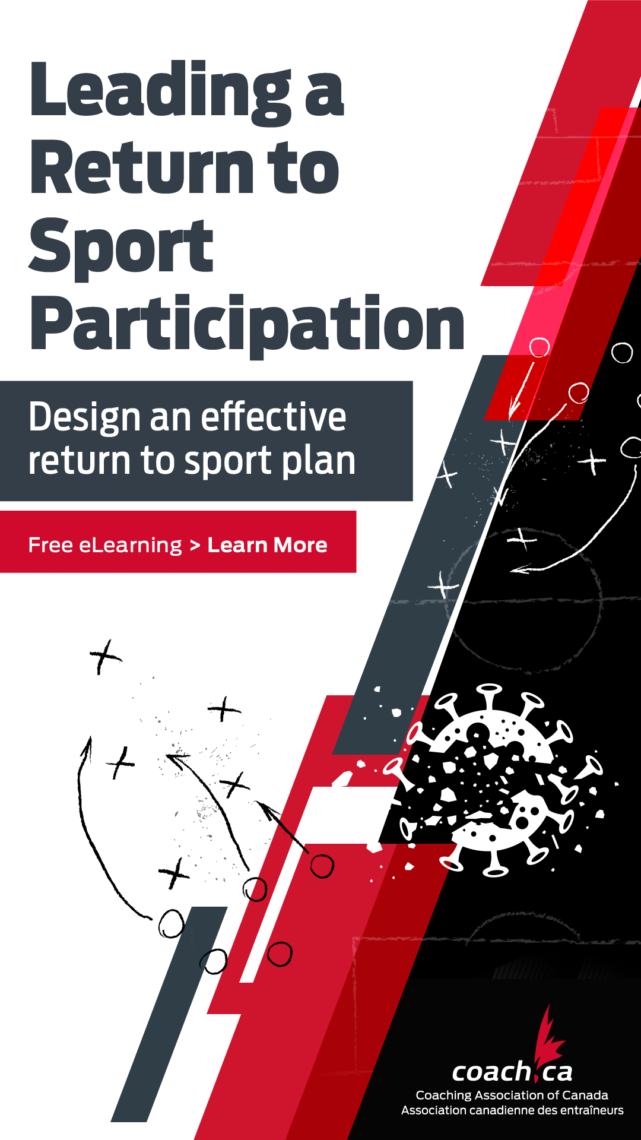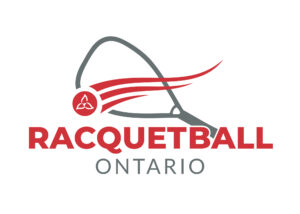Leading a Return to Sport Participation
The Leading a Return to Sport Participation eLearning module provides resources and guidance
to help coaches lead a safe and adaptive transition back to sport. Coaches will have the opportunity to review potential challenges and learn practical advice to apply when creating their own return-to-sport plan.
After completing this module, coaches will be able to:
- Identify the physical and psychosocial effects participants may be experiencing
- Understand the role of a coach in facilitating the return to sport participation
- Design a plan to return to sport participation during COVID-19
- Lead and communicate with empathy
Take advantage of this great resource to ensure a safe and successful return to sport.

Return to Play
Racquetball Canada is continuing to closely monitor the coronavirus (COVD-19) situation and is in contact with Public Health Canada and provincial, national and international organizations. Racquetball Canada is following the recommendations from Public Health and supports the local rules that are in place. In Canada physical distancing measures remain in force and we are thus not able to start group training at this point in time. Any decisions regarding return to group training would ultimately be in conjunction with provincial / local health authorities, provincial / local government bodies.
As we all work to “get back into the game” Racquetball Canada has spent the past few months updating policies, developing safe sport protocols and working to make our sport more accessible at the local, provincial and national level. For those involved in you are getting re-started please ensure you refer to our Safe Sport pages and our policies as there is new and important information that will impact your return to sport.
Racquetball Canada Return to Play Guidelines
Racquetball Canada is committed to making decisions that protect the health and safety of all our participants.
Racquetball Canada are not experts on pandemics and therefore all Federal, Provincial and local Government and Public Health Authority information, guidelines and directives supersede this information. We have created this set of guidelines to provide recommendations as to what we believe is the best course of action for provinces and clubs IF it is safe to do so from your local public health authority.
Racquetball Canada recommends a phased approach which begins the players:
- playing on their own or;
- with members of the same family.
Guidelines for Players
Please consider the following at all times;
- Ensure you are in proper physical condition to play racquetball;
- Ensure you wash your hands before and after playing racquetball;
- Take towels and your own water bottle into the court with you and leave in back corners to avoid coming in and out (this includes taking timeouts on the court);
- Consider wearing two racquetball gloves with under gloves;
- Consider having your own racquetball ball – at each serve you will serve your own ball. Only kick a ball back to your opponent and do not pick it up with your hands;
- Do not wipe any sweat on walls or doors of the court;
- Do not shower or socialize at a club – leave directly after your game to avoid coming in contact with too many people;
- Courts should be sanitized between matches.
For a more extensive list of guidelines please see the following;
Racquetball Canada Return to Play Recommendations for Players
Racquetball Canada Return to Play Recommendations for Clubs, Coaches & Organizers
Risk Mitigation Guidelines & Resources
The following Government of Canada guidelines and resources are considerations that should be applied to all training environments. These links provide important information for all athletes, coaches, clubs, facilities and organizers in assessing and reducing risk when planning for their return to sport.
STAFF KNOWLEDGE
Resources For Coaches, Athletes & Staff:
- Prevention & Risk
- Coronavirus Disease (COVID-19) Outbreak Update
- Actions you can take to stop the spread of COVID-19
- Reduce the Spread: Wash Your Hands
- About Coronavirus disease (COVID-19)
Public Health Awareness
Keep up to date with information from your local and provincial health authorities.
Isolation Capacity
Identification and management of symptomatic athletes, Isolation procedures, care of athletes in isolation:
Risk Communication
Ensure you have communication plans in place and a strategy to manage and share information.
Emergency Prepardness
Contact and tracing plans, response leaders, link to PHA, Cleaning and PPE, transportation plans:
- Cleaning and disinfecting public spaces during COVID-19
- Coronavirus (COVID-19): Being Prepared
- Non-medical masks and face coverings
Logistical Coordination
COVID -19 operations team. Link to health authorities in case of outbreak:
Specific Mitigation Measures
Health checks and monitoring:
Facility & equipment access and use:
Mental Health
Mental Health Update
Leading mental health authorities and advocacy groups are calling for an increase in mental health resources to cope with the threat of an “echo pandemic”, the significant rise in mental health issues in those significantly affected by COVID-19. The Canadian Sport community is not immune to this echo pandemic, and to help flatten the mental health spike, a preventative and proactive approach must be taken. To help mitigate the ill-effects of stress, protect mental health and promote mental fitness, it is recommended that we practice psychological hygiene as part of the daily routine. The following are some activities to be considered.
Emotional Tolerance
We must remember that emotions are an integral part of the human experience; they are there to protect us, guide us and help us recognize what we need. We should accept that our emotions are real and valid responses to this abnormal event. By understanding our emotions and core needs, we are able to increase our emotional tolerance. Valuable steps in this process include:
- Naming the emotion we are experiencing (e.g., I feel anxious and overwhelmed) and recognizing it as normal and valid (e.g., just my emotions doing their job in these times of uncertainty);
- Accepting the emotion as a normal aspect of our experience (e.g., It’s understandable that I have heightened level of anxiety given the current situation);
- Identifying needs by exploring what the emotion is revealing or why it is important (e.g., I want to be safe and need to take necessary precautions)
Stress Management
COVID-19 is an unprecedented event. As such, there is no rule book to follow and it is inevitable that stress and anxiety levels rise given the uncertainty and unpredictability of the situation we are facing. However, it is important to remember that not all stress is bad; it depends on our perspective, competencies, and support. Adversity is part of high performance sport, therefore, athletes, coaches, and IST members can use existing skills to manage challenges and the unknown. COVID-related stress management tips include:
Protective physical and psychological factors
- Engaging in physical distancing;
- Washing hands and wearing a mask and gloves when out in public;
- Staying home, especially if sick;
- Reducing information by taking breaks from watching or listening to news;
- Maintaining a sense of balance by pairing intense information processing with light activities (e.g., watching or reading something amusing, playing a game).
Stress management
- Identifying stressors and focusing on the knowledge and skills we have to manage them – keeping our confidence greater than our fears;
- Connecting with others and expressing worries and concerns to feel supported;
- Taking care of our body by exercising, eating and sleeping well, and limiting our alcohol intake;
- Spending time outdoors to benefit from mother nature’s healing effects;
- Doing breathing / relaxation exercises;
- Having fun and staying stimulated by trying out new activities / hobbies;
- Naming the emotion we are experiencing (e.g., I feel anxious and overwhelmed) and recognizing it as normal and valid (e.g., just my emotions doing their job in these times of uncertainty);
- Accepting the emotion as a normal aspect of our experience (e.g., It’s understandable that I have heightened level of anxiety given the current situation);
- Identifying needs by exploring what the emotion is revealing or why it is important (e.g., I want to be safe and need to take necessary precautions).
Mindfulness
Mindfulness is deep awareness of the present moment. It reflects our ability to BE.HERE.NOW with an accepting, nonjudgmental attitude. Mindfulness helps us to embrace all human experiences, regulate emotions, improve focus and sleep, and boost immunity. A daily dose of mindfulness training can make a world of difference
Gratitude and Growth
To help balance the part of the brain that becomes activated when exposed to perceived threat and danger (the amygdala), we can even out the input by focusing on what is good. This can be done by scanning the world around us for three good things and writing those things down at the end of each day. This activity has shown to improve levels of optimism, happiness and subjective well-being.
We can also mitigate the stress response by adopting a “challenger” mindset and looking for opportunities for growth and learning that comes with the challenge we are facing. For example, this quarantine is a great opportunity to build mental fitness and resilience skills, which can help enhance sport performance when back to training and competition.
Take a proactive and preventative approach and practice psychological hygiene on a daily basis.

